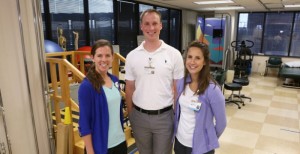
Elise Shepart, PT, DPT, left, David Jennings, PT, DPT, and Natalie Berra, PT, are taking part in Vanderbilt’s new specialized Physical Therapy residency programs. Shepart and Jennings are graduates of Belmont’s DPT program. (photo by Anne Rayner)
Story courtesy of Vanderbilt University Medical Center edited for Belmont University
Vanderbilt University Medical Center, in conjunction with the School of Physical Therapy at Belmont University, has launched specialized Physical Therapy (PT) residency programs in Orthopaedics (Sports) and Pediatrics in addition to an existing Neurological program.
“We are excited to partner with Vanderbilt for these residency programs,” said Dr. Renee Brown, PT, PhD, Professor of Physical Therapy at Belmont. “This provides an opportunity for our graduates to advance their practice after graduation and pursue specialty certification. The Neurologic residency is in its 4th year and has a 100% first time pass rate on the ABPTS board certification examination. This year the neurologic and sports residents are graduates of Belmont’s DPT (Doctorate of Physical Therapy) program.”
The residency programs make Vanderbilt one of a handful of hospital systems in the country to offer three or more physical therapy residencies. Vanderbilt’s large scale makes the multiple programs possible.
“We have such a wide network of services and physicians and specialties in both the acute care and outpatient setting,” said Dr. Andrea Donald, PT, DPT, the new director of the Neurological PT residency program. “Our residents… run a spectrum of care within Vanderbilt and they don’t have to go outside Vanderbilt to get any of that.”
One resident is selected for each of the three specialties, which begin in August. The Sports residency lasts 18 months, while the Neurological and Pediatrics residencies are 12-month positions, designed to prepare the resident to sit for board certification in their specialty from the American Board of Physical Therapy Specialties. Residents get one-on-one attention from specialists in different subspecialties, and begin to manage their own caseload of patients after about two months, Donald said.
In the Neurological residency program, the resident is mentored by eight physical therapists in the Pi Beta Phi Rehabilitation Institute, which offers comprehensive neurorehabilitation services under the umbrella of the Vanderbilt Bill Wilkerson Center.
“The residency program is in line with the mission of VUMC to develop and train the next generation of leaders in health care, and we’re doing that in physical therapy,” Donald said.
The mission is “to train expert clinicians in their area of focus or interest, to encourage advocacy of the profession and advocacy for our patient populations and to encourage clinical research,” Donald said.
The Pediatric residency program gives a wide range of experience, from acute care to outpatient, including a rotation through the Susan Gray School at Vanderbilt, a preschool for special-needs and typically developing children, said Laura Flynn, PT, PCS, director of the Pediatric residency program. Ten therapists serve as mentors as the resident participates in about 28 hours of direct clinical care per week.
The Sports residency program, though longer in length, “allows the resident to experience working in the Vanderbilt Orthopaedic Institute outpatient rehabilitation clinic 30 hours per week as well as the Vanderbilt University athletic training room to gain on-the-field experience,” said Brian Richardson, PT, MS, SCS, clinical director of the Sports residency program.
It all adds up to an experience only offered in a handful of hospital systems nationwide.
